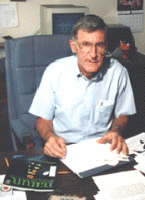 |
Claire Schelske Adjunct Research Professor of Geological Sciences Eminent Scholar Emeritus Phone: (352) 846-1789 Curriculum Vitae |
Dr. Claire Schelske’s current research is directed toward eutrophication of the Laurentian Great Lakes and shallow lakes in Florida, particularly Lake Apopka. Specific research topics include the biogeochemistry of phosphorus, silica, and iron, experimental studies of nutrient and trace limitation on biological productivity, and ecological applications of stable carbon and nitrogen isotopes. His work includes paleolimnological studies of nutrient enrichment and lacustrine productivity, lacustrine investigations at the ecosystem level, and lake restoration.
Selected Recent Publications:
Kenney, WF, Whitmore TJ, Buck DG, Brenner M, Curtis JH, Di JJ and Schelske CL (2014) Whole-basin, mass-balance approach for identifying critical phosphorus-loading thresholds in shallow lakes. Journal of Paleolimnology. DOI 10.1007/s10933-014-9771-9 (PDF)
Kenney, W.F., M. Brenner, J. Curtis, C. Schelske. Identifying sources of organic matter in sediments of shallow lakes using multiple geochemical variables. J Paleolimnol, Published online: 14 October 2010. (PDF)
Claire L. Schelske, Eugene F. Stoermer, William F. Kenney. Historic low-level phosphorus enrichment in the Great Lakes inferred from biogenic silica accumulation in sediments. Limnol. Oceanogr., 50(5), 2005, 000–000. (PDF)
Claire L. Schelske, Edgar F. Lowe, William F. Kenney, Lawrence E. Battoe, Mark Brenner, and Michael F. Coveney. How anthropogenic darkening of Lake Apopka induced benthic light limitation and forced the shift from macrophyte to phytoplankton dominance. Limnol. Oceanogr., 55(3), 2010, 1201–1212. (PDF)
Claire L. Schelske, Edgar F. Lowe, Lawrence E. Battoe, Mark Brenner, Michael F. Coveney and William F. Kenney. Abrupt Biological Response to Hydrologic and Land-use Changes in Lake Apopka, Florida, USA. Royal Swedish Academy of Sciences 2005 Ambio Vol. 34, No. 3, May 2005 (PDF)
Kenney, W.F., M.N. Waters, C.L. Schelske, and M. Brenner. 2002. Sediment records of phosphorus-driven shifts to phytoplankton dominance in shallow Florida lakes. Journal of Paleolimnology 27: 367-377. (PDF).
Shumate, B.C., C.L. Schelske, T.L. Crisman, and W.F. Kenney. 2002. Response of the cladoceran community to trophic state change in Lake Apopka, Florida. Journal of Paleolimnology 27: 71-77. (PDF).
Kenney, W.F., C.L. Schelske, and A.D. Chapman. 2001. Changes in polyphosphate sedimentation: a response to excessive phosphorus enrichment in a hypereutrophic lake. Canadian Journal of Fisheries and Aquatic Sciences 58: 879-887.
Brenner, M., C.L. Schelske, and L.W. Keenan. 2001. Historical rates of sediment accumulation and nutrient burial in marshes of the Upper St. Johns River Basin, Florida, USA. Journal of Paleolimnology 26: 241-257. (PDF).
Schelske, C.L., and W.F. Kenney. 2001. Model erroneously predicts failure for restoration of Lake Apopka, a hypereutrophic, subtropical lake. Hydrobiologia 448: 1-5. (PDF).